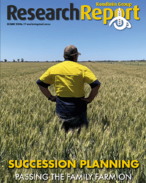This article is 7 years old. Images might not display.
The new strains of wheat have been genetically modified to remove 90 per cent of gliadins in the cereal so the grain still behaves like traditional wheat during the baking process.
Gliadins are a class of proteins essential for giving bread the ability to rise properly during baking and because the new strains still contain only small amounts of these proteins, the end product baked goods do not trigger immune reaction symptoms.
Jan Chojecki of PBL-Ventures in the UK, who is working with investors in North America to market products made with this new strain of wheat, said a genetic modification technique was used to remove 35 out of the 45 genes in wheat plant DNA that stop most of the proteins from being made.
“It’s regarded as being pretty good, certainly better than anything on the gluten-free shelves,” Mr Chojecki said.
The scientific team used two forms of gene manipulation techniques RNA interference and Clustered Regularly Interspaced Short Palindromic Repeats (CRISPR) gene editing to knock out 90% of the proteins associated with coeliac disease.
Chojecki said more genes need to be disabled before the CRISPR strain is ready for testing, but it should be worth all the effort.
“The team have already shown that the GM wheat strain makes an acceptable bread. It cannot be used for making large sliced loafs, but is good enough for baguettes and rolls,” he said.
Small trials of the GM wheat involving 10 and 20 people with coeliac disease are already being carried out in Mexico and Spain through the Institute for Sustainable Agriculture in Cordoba.
“All I can say is that the results are very encouraging,” Chojecki said.
Head of patients’ group Coeliac UK Sarah Sleet said some people will be very happy because sticking to a gluten-free diet is difficult.
“However, some may not want to eat genetically modified foods, or to take the risk that some immune-triggering components remain in the wheat,” Ms Sleet said.






















